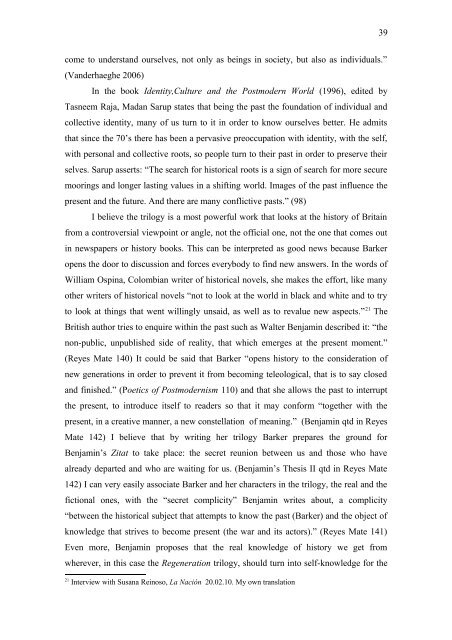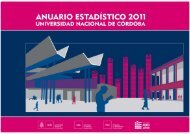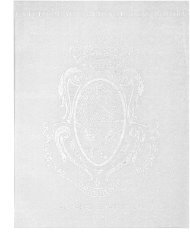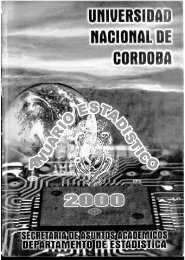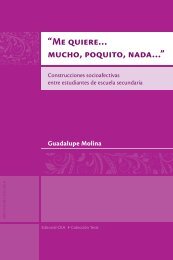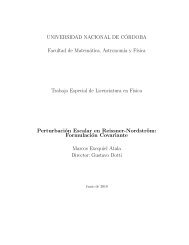Chapter I - RDU - Universidad Nacional de Córdoba
Chapter I - RDU - Universidad Nacional de Córdoba
Chapter I - RDU - Universidad Nacional de Córdoba
You also want an ePaper? Increase the reach of your titles
YUMPU automatically turns print PDFs into web optimized ePapers that Google loves.
39come to un<strong>de</strong>rstand ourselves, not only as beings in society, but also as individuals.”(Van<strong>de</strong>rhaeghe 2006)In the book I<strong>de</strong>ntity,Culture and the Postmo<strong>de</strong>rn World (1996), edited byTasneem Raja, Madan Sarup states that being the past the foundation of individual andcollective i<strong>de</strong>ntity, many of us turn to it in or<strong>de</strong>r to know ourselves better. He admitsthat since the 70’s there has been a pervasive preoccupation with i<strong>de</strong>ntity, with the self,with personal and collective roots, so people turn to their past in or<strong>de</strong>r to preserve theirselves. Sarup asserts: “The search for historical roots is a sign of search for more securemoorings and longer lasting values in a shifting world. Images of the past influence thepresent and the future. And there are many conflictive pasts.” (98)I believe the trilogy is a most powerful work that looks at the history of Britainfrom a controversial viewpoint or angle, not the official one, not the one that comes outin newspapers or history books. This can be interpreted as good news because Barkeropens the door to discussion and forces everybody to find new answers. In the words ofWilliam Ospina, Colombian writer of historical novels, she makes the effort, like manyother writers of historical novels “not to look at the world in black and white and to tryto look at things that went willingly unsaid, as well as to revalue new aspects.” 21 TheBritish author tries to enquire within the past such as Walter Benjamin <strong>de</strong>scribed it: “thenon-public, unpublished si<strong>de</strong> of reality, that which emerges at the present moment.”(Reyes Mate 140) It could be said that Barker “opens history to the consi<strong>de</strong>ration ofnew generations in or<strong>de</strong>r to prevent it from becoming teleological, that is to say closedand finished.” (Poetics of Postmo<strong>de</strong>rnism 110) and that she allows the past to interruptthe present, to introduce itself to rea<strong>de</strong>rs so that it may conform “together with thepresent, in a creative manner, a new constellation of meaning.” (Benjamin qtd in ReyesMate 142) I believe that by writing her trilogy Barker prepares the ground forBenjamin’s Zitat to take place: the secret reunion between us and those who havealready <strong>de</strong>parted and who are waiting for us. (Benjamin’s Thesis II qtd in Reyes Mate142) I can very easily associate Barker and her characters in the trilogy, the real and thefictional ones, with the “secret complicity” Benjamin writes about, a complicity“between the historical subject that attempts to know the past (Barker) and the object ofknowledge that strives to become present (the war and its actors).” (Reyes Mate 141)Even more, Benjamin proposes that the real knowledge of history we get fromwherever, in this case the Regeneration trilogy, should turn into self-knowledge for the21Interview with Susana Reinoso, La Nación 20.02.10. My own translation


